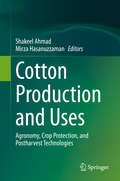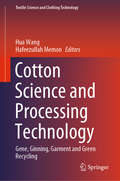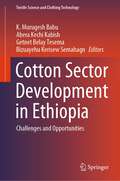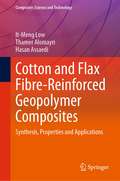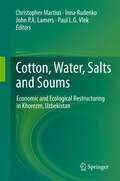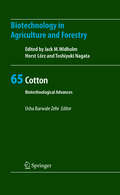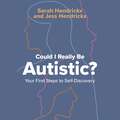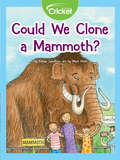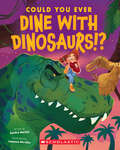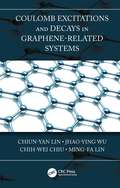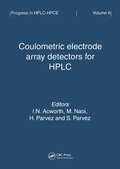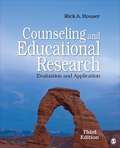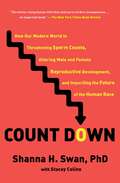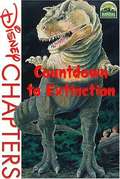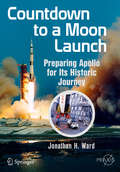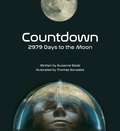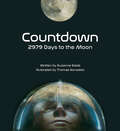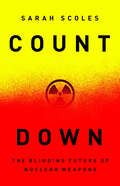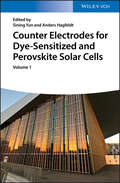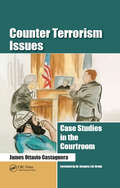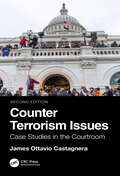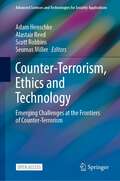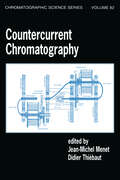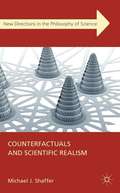- Table View
- List View
Cotton Production and Uses: Agronomy, Crop Protection, and Postharvest Technologies
by Mirza Hasanuzzaman Shakeel AhmadThis book provides a comprehensive and systematic overview of the recent developments in cotton production and processing, including a number of genetic approaches, such as GM cotton for pest resistance, which have been hotly debated in recent decades. In the era of climate change, cotton is facing diverse abiotic stresses such as salinity, drought, toxic metals and environmental pollutants. As such, scientists are developing stress-tolerant cultivars using agronomic, genetic and molecular approaches. Gathering papers on these developments, this timely book is a valuable resource for a wide audience, including plant scientists, agronomists, soil scientists, botanists, environmental scientists and extention workers.
Cotton Science and Processing Technology: Gene, Ginning, Garment and Green Recycling (Textile Science and Clothing Technology)
by Hua Wang Hafeezullah MemonThis book summarizes all different fields of cotton fiber, including genetics, fiber chemistry, soft materials, textile, and fashion engineering. It also contains some new applications such as biomaterials, nanocoated smart fabrics, and functional textiles. Moreover, the significant improvement recently in gene modification and gene technology is introduced. This book discusses all these aspects in a more straightforward way, and new illustrations will help readers to understand the contents. It is intended for undergraduate and graduate students who are interested in cotton science and processing technologies, researchers investigating the updated applications of cotton in various fields as well as industrialists who want to have a quick review of the cotton and its different stages.
Cotton Sector Development in Ethiopia: Challenges and Opportunities (Textile Science and Clothing Technology)
by Abera Kechi Kabish K. Murugesh Babu Getnet Belay Tesema Bizuayehu Kerisew SemahagnThis book highlights the development of cotton sector and its related issues, in Ethiopia. The book is a comprehensive collection of detailed chapters ranging from agricultural aspects of cotton, its value chain, and economics. It provides an overview of the cotton sector development and the challenges faced in the growth and extension of cotton production and research in three separate sections i.e., cotton agriculture, cotton fibre technology and cross-cutting issues in the cotton sector. In the first part of the book, agricultural aspects of cotton fibre production such as, cotton agronomy, genetics and breeding, biotechnology, mechanized production, crop harvesting management are discussed in detail. This is followed by chapters concerned to a comprehensive knowledge on cotton fibre demand and supply in Ethiopia, ginning technology and industries, cotton quality testing and grading, quality requirements for spinning, cotton fabric production, chemical processing aspects and therole of cotton fabrics in the Ethiopian fashion industry. The final section of the book deals with chapters on the cotton seed production techniques, cotton research and promotion, challenges in quality cotton production, cotton value chain and economics and sustainable cotton production. This book is a valuable resource for all those concerned with cotton biology and agriculture, production and extension, research and development, fashion industry, research and academia.
Cotton and Flax Fibre-Reinforced Geopolymer Composites: Synthesis, Properties and Applications (Composites Science and Technology)
by It-Meng Low Thamer Alomayri Hasan AssaediThis book provides an overview on the latest advances in the synthesis, properties and applications of geopolymers reinforced with natural fibres such as pulp fibre, cotton, sisal, flax and hemp. The influence of adding various natural fibres and nanofillers on the mechanical properties of these composites is discussed. Potential challenges and future directions of these composites are highlighted and addressed. The content of this book caters to students, researchers and academics who are interested in the synthesis and applications of geopolymers composites.
Cotton, Water, Salts and Soums: Economic and Ecological Restructuring in Khorezm, Uzbekistan
by Inna Rudenko P.L.G. Vlek John P.A. Lamers Christopher MartiusThis book summarizes a long-term research project addressing land and water use in the irrigated areas of the Aral Sea basin. In an interdisciplinary approach, natural and human sciences are combined to elucidate the challenges of economic transition that affect the use of land, water and biological resources, ecological sustainability, economic efficiency and the livelihoods of the local population. The research focuses on Khorezm, a region in Uzbekistan, located on the Amudarya river, in the heart of Central Asia. A series of chapters describes the biophysical environment and the aspects of society and institutions that shape land and water use. The book discusses options and tools to improve land and water management, and to reform the economic system management, based on agronomic, hydrological, economic ans social studies and modeling. The insights are not only important for Uzbekistan, but for all countries in transitions and irrigated dryland areas elsewhere.
Cotton: Biotechnological Advances (Biotechnology in Agriculture and Forestry #65)
by Usha Barwale ZehrThe growing global population poses the challenge to the scientific community of doubling or tripling the food, feed and fiber production by the year 2050. Biotechnology can make a significant contribution to this effort. This volume reviews the use of biotechnology in cotton, which is the leading plant fiber crop worldwide and grown commercially in more than 50 countries. Renowned experts highlight the success of Bt cotton, the introduction of second and third generation traits and the impact at all levels of farming. Furthermore, the molecular advances being made in cotton biotechnology and the potential traits that will come to market in the next decade are described in detail.
Cottontails
by Ron FisherHow the cottontail rabbit explores its environment, eats, washes, senses danger, rests, and cares for its young. Also describes wild and domestic rabbits around the world. Images are described.
Could I Really Be Autistic?: Your First Steps to Self-Discovery
by Sarah Hendrickx Jess HendrickxPerhaps a child in your family has been diagnosed as autistic, your therapist has suggested it, or people you know have called you 'Rain Man' throughout your life. Whatever the reason, here you are, either seeking to confirm or dispel the idea that you might be autistic.Written by two experts in autism assessment, this is a pathway for you to explore the likelihood of meeting the diagnostic threshold for autism, while offering advice on possible next steps.With guidance on ways autism can manifest in day-to-day life, factors that prompt people to wrongly dismiss the label (I'm too old/clever/social/ married!), commonly co-occurring conditions, and alternative explanations for autistic traits - this will help you decide whether a professional assessment is appropriate, and give you the best chance of an accurate outcome should you seek one. Filling the gap between self-identification and formal diagnosis, this rigorous, accessible guide to diagnosis will give you confidence in taking the next steps on your autism journey.
Could We Clone a Mammoth?
by Esther LandhuisDuring the last Ice Age, large, hairy elephants roamed Asia and the Americas. But by about 4,000 years ago, all the mammoths and mastodons had vanished. Could these ancient beasts ever come back to life?
Could You Ever Dine with Dinosaurs!?
by Sandra MarkleSpend a day with carnivorous dinosaurs in this fantastic new series from Sandra Markle, the bestselling author of the What If You Had... series! What if you could spend a day with your favorite animals? What would you eat? How would you play? Would you ever want to leave?Pull up a chair and get ready to dine with carnivorous dinosaurs in the third book in the Could You Ever... series! Learn all about what different meat-eating dinosaurs feasted on, when they lived, and more! This innovative book places kids right into the action as they learn all about these amazing creatures.With imaginative, interactive text from bestselling author Sandra Markle and engaging art from Vanessa Morales, this book is sure to be a kid favorite!
Coulomb Excitations and Decays in Graphene-Related Systems
by Ming-Fa Lin Chiun-Yan Lin Jhao-Ying Wu Chih-Wei ChiuCoulomb Excitations and Decays in Graphene-Related Systems provides an overview of the subject under the effects of lattice symmetries, layer numbers, dimensions, stacking configurations, orbital hybridizations, intralayer and interlayer hopping integrals, spin-orbital couplings, temperatures, electron/hole dopings, electric field, and magnetic quantization while presenting a new theoretical framework of the electronic properties and the electron-electron interactions together. This book presents a well-developed theoretical model and addresses important advances in essential properties and diverse excitation phenomena. Covering plenty of critical factors related to the field, the book also addresses the theoretical model which is applicable to various dimension-enriched graphene-related systems and other 2D materials, including layered graphenes, graphites, carbon nanotubes, silicene, and germanene. The text is aimed at professionals in materials science, physics, physical chemistry, and upper level students in these fields.
Coulometric Electrode Array Detectors for HPLC
by M. Naoi H. Parvez S. Parvez I. N. AcworthThis sixth volume in the book series Progress in HPLC-HPCE examines the enhancement of high- performance liquid chromatography through the development of an advanced mode of electrochemical detection (ECD) --- the coulometric array detection --- from its initial, yet problematic, amperometric (thin-layer) design to the highly sensitive, selective and stable coulometric (flow-through) design. Unlike amperometric electrodes, the coulometric electrode is 100% efficient and measures signals from all of the analyte passing through it, which leads to improved sensitivity as well as unique selectivity. The coulometric electrode array offers the resolution of the photodiode array with the extreme sensitivity of an electrochemical detector.
Counseling And Educational Research: Evaluation And Application, 3rd Edition
by Rick A. HouserThe Third Edition of Counseling and Educational Research: Evaluation and Application emphasizes the importance of being a good consumer of research and teaches readers how to conduct research in practice. Written in an engaging, conversational tone, the book uses concrete examples from professional literature to demonstrate how to effectively evaluate and interpret research articles--without relying on discipline-specific jargon. The Third Edition features new examples, updated research, a new chapter on single-subject research, a new chapter on the use of technology and research, and much more.
Count Down: How Our Modern World Is Threatening Sperm Counts, Altering Male and Female Reproductive Development, and Imperiling the Future of the Human Race
by Stacey Colino Shanna H. SwanIn the tradition of Silent Spring and The Sixth Extinction, an urgent, &“disturbing, empowering, and essential&” (Kirkus Reviews, starred review) book about the ways in which chemicals in the modern environment are changing—and endangering—human sexuality and fertility on the grandest scale, from renowned epidemiologist Shanna Swan.In 2017, author Shanna Swan and her team of researchers completed a major study. They found that over the past four decades, sperm levels among men in Western countries have dropped by more than 50 percent. They came to this conclusion after examining 185 studies involving close to 45,000 healthy men. The result sent shockwaves around the globe—but the story didn&’t end there. It turns out our sexual development is changing in broader ways, for both men and women and even other species, and that the modern world is on pace to become an infertile one. How and why could this happen? What is hijacking our fertility and our health? Count Down unpacks these questions, revealing what Swan and other researchers have learned about how both lifestyle and chemical exposures are affecting our fertility, sexual development—potentially including the increase in gender fluidity—and general health as a species. Engagingly explaining the science and repercussions of these worldwide threats and providing simple and practical guidelines for effectively avoiding chemical goods (from water bottles to shaving cream) both as individuals and societies, Count Down is &“staggering in its findings&” (Erin Brockovich, The Guardian) and &“will serve as an awakening&” (The New York Times Book Review).
Countdown to Extinction
by Barbara Gaines WinkelmanChildren's book about the study and research into dinosaurs that have become extinct.
Countdown to a Moon Launch: Preparing Apollo for Its Historic Journey (Springer Praxis Books)
by Jonathan H. WardThousands of workers labored at Kennedy Space Center around the clock, seven days a week, for half a year to prepare a mission for the liftoff of Apollo 11. This is the story of what went on during those hectic six months. Countdown to a Moon Launch provides an in-depth look at the carefully choreographed workflow for an Apollo mission at KSC. Using the Apollo 11 mission as an example, readers will learn what went on day by day to transform partially completed stages and crates of parts into a ready-to-fly Saturn V. Firsthand accounts of launch pad accidents, near misses, suspected sabotage, and last-minute changes to hardware are told by more than 70 NASA employees and its contractors. A companion to Rocket Ranch, it includes many diagrams and photographs, some never before published, to illustrate all aspects of the process. NASA's groundbreaking use of computers for testing and advanced management techniques are also covered in detail. This book will demystify the question of how NASA could build and launch Apollo missions using 1960s technology. You'll discover that there was no magic involved - just an abundance of discipline, willpower, and creativity.
Countdown: 2979 Days To The Moon
by Suzanne Slade Thomas GonzalezPowerful free verse and stunning illustrations tell the true story of the American effort to land the first man on the Moon. <p><p> In 1961, President John F. Kennedy announced that the United States would try to land a man on the Moon by the end of the decade. During the two thousand, nine hundred and seventy-nine days that followed his speech, eighteen astronauts climbed into spaceships; three of them died before even leaving the ground. Eight rockets soared into space. And four hundred thousand people -- engineers, technicians, scientists, mathematicians, and machinists -- joined Project Apollo in hopes of making the dream a reality. <p> Award-winning author and former mechanical engineer Suzanne Slade joins up with New York Times best-selling illustrator Thomas Gonzalez to tell the powerful story of the successes, failures, triumphs, tragedies, and lessons learned from Apollos 1 through 10 that led to the first Moon landing.
Countdown: 2979 Days to the Moon
by Suzanne SladeThe captivating true story of NASA's effort to land the first man on the Moon is told through powerful free verse and stunning illustrations. An inspiring testament to American grit, teamwork, and ingenuity, Countdown presents exhilarating, informative, and accessible free verse by award-winning author Suzanne Slade paired with historic photographs and detailed illustrations by New York Times best-selling illustrator Thomas Gonzalez. Together, they capture the gripping historic story of NASA's twentieth century efforts to conquer a new space frontier. Through triumph and tragedy, success and failure, an entire nation is glued to the high-stakes, 2,979-day mission as eighteen astronauts climb into spacecraft; three men die before even leaving the ground; eight rockets soar into space; and four hundred thousand people―engineers, technicians, scientists, mathematicians, and machinists―join Project Apollo in pursuit of making a dream a reality.
Countdown: The Blinding Future of Nuclear Weapons
by Sarah ScolesFor fans of Oppenheimer, a riveting investigation into the modern nuclear weapons landscape. Nuclear weapons are, today, as important as they were during the Cold War, and some experts say we could be as close to a nuclear catastrophe now as we were at the height of that conflict. Despite that, conversations about these bombs generally often happen in past tense. In Countdown, science journalist Sarah Scoles uncovers a different atomic reality: the nuclear age&’s present. Drawing from years of on-the-ground reporting at the nation's nuclear weapons labs, Scoles interrogates the idea that having nuclear weapons keeps us safe, deterring attacks and preventing radioactive warfare. She deftly assesses the existing nuclear apparatus in the United States, taking readers beyond the news headlines and policy-speak to reveal the state of nuclear-weapons technology, as well as how people currently working within the U.S. nuclear weapons complex have come to think about these bombs and the idea that someone, someday, might use them. Through a sharp, surprising, and undoubtedly urgent narrative, Scoles brings us out of the Cold War and into the twenty-first century, opening readers' eyes to the true nature of nuclear weapons and their caretakers while also giving us the context necessary to understand the consequences of their existence, for worse and for better, for now and for the future.
Counter Electrodes for Dye-sensitized and Perovskite Solar Cells
by Anders Hagfeldt Sining YunA guide to one of the most important aspects for affordable and highly efficient dye-sensitized solar cells Dye-sensitized solar cells have the potential to be one of the most promising photovoltaic technologies for production of renewable and clean energy. Counter Electrodes for Dye-Sensitized and Perovskite Solar Cells offers an introduction to the various types of counter electrode catalysts for dye-sensitized solar cells and perovskite solar cells, including metal and metal compounds, carbon materials, polymers, and composites. With contributions from an international panel of experts, the book contains a discussion of the design and synthesis of the catalysts, characterization and stability of the devices, as well as calculations on properties. The contributors cover a wide range of topics including information on: carbon nanotubes electrocatalysts for I-mediated dye-sensitized solar cells; Pt-loaded composite electrocatalysts for I-mediated dye-sensitized solar cells; metal contact electrodes for perovskite solar cells; and much more. The book also includes insight into the future developments in the field. This important resource Covers the various types of counter electrode catalysts and presents design strategies, synthesis methods, theoretical calculation and stability evaluation Includes information on low-cost counter electrode catalysts and commercial applications of dye-sensitized sensitized solar cells Disscuses how electrode catalysts can be applied in a range of fields, such as solar cells, fuel cells, hydrogen production, and photocatalysis Offers contributions from leading experts in the field including Anders Hagfeldt, one of the world's leading researchers in this field Written for materials scientists, solid state chemists, electrochemists, catalytic chemists, solid state physicists, and chemical industry professionals, Counter Electrodes for Dye-Sensitized and Perovskite Solar Cells is a comprehensive and authoritative guide to dye-sensitized solar cells.
Counter Terrorism Issues: Case Studies in the Courtroom
by James Ottavio CastagneraThe American legal profession and judicial system bear a unique responsibility to set and maintain the balance between defending homeland security and protecting the civil liberties outlined in the Bill of Rights. These competing interests will continue to collide as the threats to our safety grow. Exploring the most significant terrorist cases of
Counter Terrorism Issues: Case Studies in the Courtroom
by James Ottavio CastagneraCounter Terrorism Issues: Case Studies in the Courtroom, Second Edition presents a panoramic view of the American judiciary’s handling of domestic terrorism in the last 30 years. As has played out in recent history, the American legal profession and judicial system bear a unique responsibility to set and maintain the balance between defending homeland security and protecting the civil liberties outlined in the Bill of Rights. These competing interests will continue to collide as the threats to our safety grow.The book examines some of the most notorious cases—the two attacks on the World Trade Center, the Oklahoma City bombing, and the Fort Hood massacre. Updates from the First Edition include a reflection on the Boston Marathon bombing, as well as an examination of the events of January 6, 2021, the subsequent legal proceedings and convictions of those involved in the assault on the U.S. Capitol, and the danger arising from increased domestic extremism and violent rhetoric from the right.Drawing extensively upon trial transcripts, witness statements, and judicial opinions, the book reviews the events and cases to demonstrate how the criminal justice system has grappled with conflicting facts and countervailing legal rights and responsibilities. Through the words of witnesses, judges, and the attorneys who tried these cases in America’s courtrooms, coverage provides important commentary on the historical/political contexts of these events, enabling readers to understand the significance of these infamous attacks on U.S. soil.
Counter-Terrorism, Ethics and Technology: Emerging Challenges at the Frontiers of Counter-Terrorism (Advanced Sciences and Technologies for Security Applications)
by Seumas Miller Adam Henschke Alastair Reed Scott RobbinsThis open access book brings together a range of contributions that seek to explore the ethical issues arising from the overlap between counter-terrorism, ethics, and technologies. Terrorism and our responses pose some of the most significant ethical challenges to states and people. At the same time, we are becoming increasingly aware of the ethical implications of new and emerging technologies. Whether it is the use of remote weapons like drones as part of counter-terrorism strategies, the application of surveillance technologies to monitor and respond to terrorist activities, or counterintelligence agencies use of machine learning to detect suspicious behavior and hacking computers to gain access to encrypted data, technologies play a significant role in modern counter-terrorism. However, each of these technologies carries with them a range of ethical issues and challenges. How we use these technologies and the policies that govern them have broader impact beyond just the identification and response to terrorist activities. As we are seeing with China, the need to respond to domestic terrorism is one of the justifications for their rollout of the “social credit system.” Counter-terrorism technologies can easily succumb to mission creep, where a technology’s exceptional application becomes normalized and rolled out to society more generally. This collection is not just timely but an important contribution to understand the ethics of counter-terrorism and technology and has far wider implications for societies and nations around the world.
Countercurrent Chromatography (Chromatographic Science Series)
by Jean-Michel Menet Didier ThiebautCovering definitions, concepts, and applications, Countercurrent Chromatography recounts the developments in two types of liquid-liquid chromatography termed countercurrent-high-speed countercurrent chromatography (HSCCC) and centrifugal partition chromatography (CPC)-as well as the HSCCC-derived cross-axis CCC, a versatile technique for purificati
Counterfactuals and Scientific Realism
by Michael J. ShafferScientific realism is the view that the sciences aim to discover scientific theories that are true, or at least approximately true. Scientific realism is widely accepted by both scientists and philosophers of science. However, in practice - and perhaps even in principle - scientists are forced to simplify theories by idealizing. Some more skeptical philosophers of science have questioned the acceptability of scientific realism because they claim that theories involving idealizations are not even approximately true. This book is an attempt to show that scientific realism is compatible with the presence of idealization in the sciences. The main contention of this book is that idealized theories can be treated as counterfactuals about how things are in worlds that are similar to but simpler than the actual world. So understood it is clear that they have perfectly ordinary truth conditions. This implies that scientific theories that incorporate idealizations can be true despite the objections of anti-realists.
